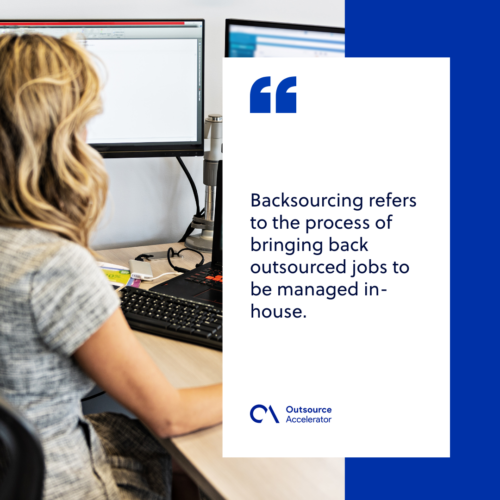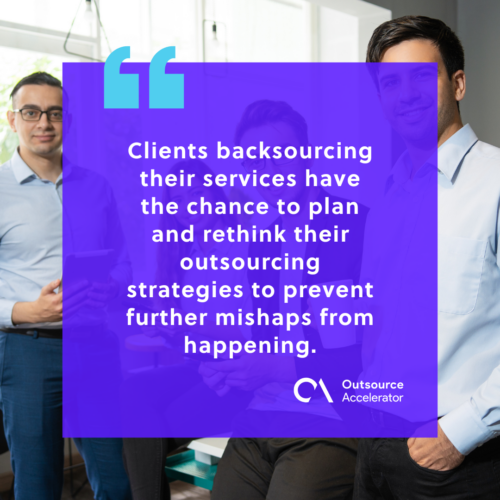To backsource or not: Why companies choose backsourcing (and will it benefit them?)

During the years, there have been cases of companies taking back their outsourced services to their home countries for different reasons.
For instance, in the United States, companies have been encouraged to take their functions back for costs and restrictions made by the government. Meanwhile, UK companies thought their customers should interact with locals, as they want.
Backsourcing has been around for decades, almost as old as the BPO industry in itself. But is it a better option for companies?
Explore how backsourcing works and how it can make outsourcing strategies better in this article.
How does backsourcing work
Backsourcing refers to the process of bringing back outsourced jobs to be managed in-house. Usually, companies that backsource their services encounter problems with service providers in terms of agreed costs, clauses, or return of investment.
Aside from this, backsourcing happens in line with internal or external organizational changes, especially in reorganization.
Though existing for years now, this method gained traction and has become a hot topic in the US and the UK. Political and economic factors have even come to play with its demand.
Businesses started to question the intention they have in outsourcing and if it benefited them.

Mainly, they would only see the industry as a way to cut costs rather than its long-term effect. There has even been pressure from their home countries to pull their services back due to increased restrictions.
Backsourcing vs insourcing vs outsourcing
Backsourcing and insourcing are usually interchanged when used, though the two can be distinguished easily. Let’s see how the two differ and relate to outsourcing.
Outsourcing is the delegation of a service to a third-party provider. It is used as an umbrella term for delegating services to a local company (onshore), a neighboring country (nearshore), or a location miles away (offshore).
On the other hand, backsourcing plays into the fact that a company has outsourced before and is pulling their services back to their countries. Global businesses of all sizes have been doing this as a strategy in case anything goes wrong with their agreement.
Insourcing, meanwhile, occurs when a function is done exclusively in-house. Instead of outsourcing, a company decided to hire in-house staffing to do certain functions such as manufacturing.
Why do companies choose backsourcing
Usually, companies that outsource their services are satisfied with their progress and increase their efforts in the future. However, some still decide to do backsourcing for the following factors.
Conflicts with their service provider
Companies might find themselves having conflicts with their providers. While they naturally face challenges when outsourcing, some of them might be the reason their operations fail or reflect poor performance.
Several factors usually cause their conflict.
- Costs. A company might be spending more than its budgeted costs due to hidden charges and services not disclosed in its agreement.
- Service levels. They might not be seeing a return of investment from their outsourced services since service levels are not met.
- Concerns on control. With the lack of total control over their operations, clients might feel “locked out” from their teams. They tend to think about their suppliers having more knowledge of their company than them.
- Savings. Clients might feel that they’re saving less on costs the more they increase their outsourcing effort and expectations.

Organizational changes
There are times when organizational changes also cause a business to do backsourcing. There may be changes in stakeholders or executives, some may disagree with their current outsourcing model, while some would like to try new strategies.
More likely, these new CEOs and CIOs provoke this change by “reconsidering the value” of their offshore functions.
Increased restrictions and pressure
The stigma still exists about the BPO industry “taking away jobs” from local employees. This causes an outcry and pressure for companies to return their delegated services to their home countries.
Along with this, some developed countries have increased their restrictions for companies contracting offshore services.
Security concerns
Lastly, an increase in data security breaches has been reported in 2020 alone. These instances compromised customer and company data from different organizations around the world.
Security concerns like this even trigger companies to do backsourcing more. Thinking of the safety of their data, they decide to take some of their functions back, whether permanently or for a certain period.
Does backsourcing benefit them?
There has been a move to encourage outsourced services to companies worldwide for decades. Though, backsourcing can also benefit companies wanting to change their ways.
- Opportunity for restrategizing. Clients backsourcing their services have the chance to plan and rethink their outsourcing strategies to prevent further mishaps from happening.
- Regaining control. This also takes the operational control back to them, giving them time to reevaluate their processes and what would work best for their business.
- Balancing delegated services. Some organizations that do this usually have too many services delegated offshore in the first place. Through backshoring, they get to review what tasks they could outsource better and what would be kept in-house.
- Preparing for a more suitable provider. Lastly, backsourcing gives them time to look for a service provider that will take better care of them.

Backsourcing as a strategy for your business
In the end, backsourcing is still better than insourcing in any way. This could indicate that you already have experience in delegating your services offshore and would like to improve it in the future.
However, keep in mind that backsourcing should not be the “end game” for your services. If you’re looking to backsource your operations, consider doing the following steps.
- Set clear intentions. Set clear purpose and intentions on backsourcing your services. Check every aspect including the return of investment, team’s performance, and service level agreement to check what went wrong with your outsourced function.
- Ensure workforce and systems availability. Before backsourcing, make sure that you have a sufficient team of in-house talents that can do the tasks better. At the same time, your systems should be capable of handling the volume of workload you’ll accommodate.
- Plan for better outsourcing. Admittedly, it might take time for you to outsource again depending on your bad experience. In case you’re ready to outsource again, have a more detailed plan on delegating your services and finding the right provider.







 Independent
Independent




